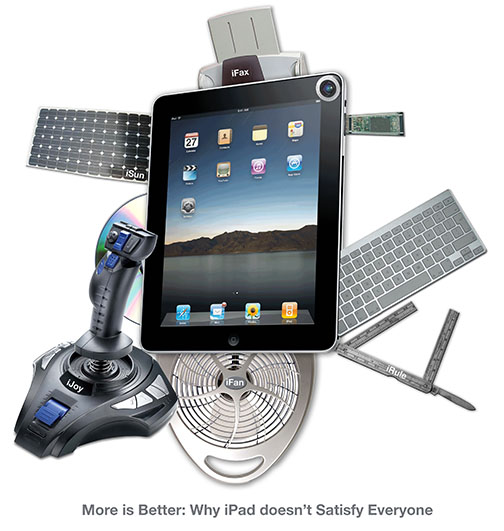There have been a lot of complaints flying around about how iPad doesn’t do this, and iPad can’t do that, and iPad won’t work with that other thing. Some people are so obsessed about all the things that iPad isn’t capable of doing that they overlook all that it can do. By looking for failure, these reviewers lost sight of what iPad is all about.
There are plenty of people who are defending iPad out there, so I was interested in why the people who dislike iPad so passionately feel the way they do. We, the people, tend to make our decisions based on little snippets of information that we find to be true and productive for solving various problems. “If something is steaming, it must be hot.” “Big things fall harder and faster.” “Where there’s smoke, there’s fire.” “If one is good, two is even better.” “If it looks clean…” “Little kids don’t lie.” “If it’s natural, it’s not chemical.” “Summer is when the Earth is closest to the sun.” “One can’t get fat eating vegetables.” These are the building blocks of our intuitions.
We are all walking encyclopedias of folksy wisdom—common sense explanations that are consciously and unconsciously spread by the communities to which we belong. Some of these snippets of wisdom are true, some are not, and people pick and choose among them depending on circumstances, easily wielding contradictory ideas to make every-day decisions. These snippets of folksy wisdom are not products of our individual thoughtful deliberations. In fact, most people would have difficulty articulating them or providing explanations of their origins. And these snippets tend to have strong emotional underpinnings, resulting in passionate snap judgments.
A few decades ago, when I was a grad student at Berkeley, I went looking for some knowledge snippets at an Oakland elementary school. My best find was “more is better.” This bit of folksy wisdom permeated every aspect of these students’ lives: thicker books had more knowledge as did heavier books; kids with more friends were better people as were those with more money. But it’s not just fifth graders that held this truth to be self-evident. American culture reinforces “more is better” wisdom snippet at every turn. Tall people make more money. Rich people are more attractive. Bigger breast are more desirable. We’re giving 110% to our projects now. And when it comes to computers, the more features the better. And it’s not only the average American consumer that feels this way. Companies that produce software and hardware rate and compare each others’ systems by the length of their feature sets: more is better.
So it’s not a surprise that when Apple’s iPad came out, it too was judged by its feature set…and it came up short! Reviewers raved how it couldn’t even begin to compare to a laptop (or even a smart phone). More is better! The reaction was emotional, as all reactions that are based of snippets of folksy wisdom. But those who went ahead and got an iPad anyway had another emotional reaction. This one was based on the actual experience with the Apple device. I have yet to come across an iPad owner who regrets the purchase.
The world is full folksy wisdom—messy and culturally-dependent, emotionally-driven, totally contradictory and situationally-specific, mostly inarticulate snippets of knowledge. Product designers and sales people have to have deep understanding of folksy wisdom among their users and in the market places they are pursuing.

